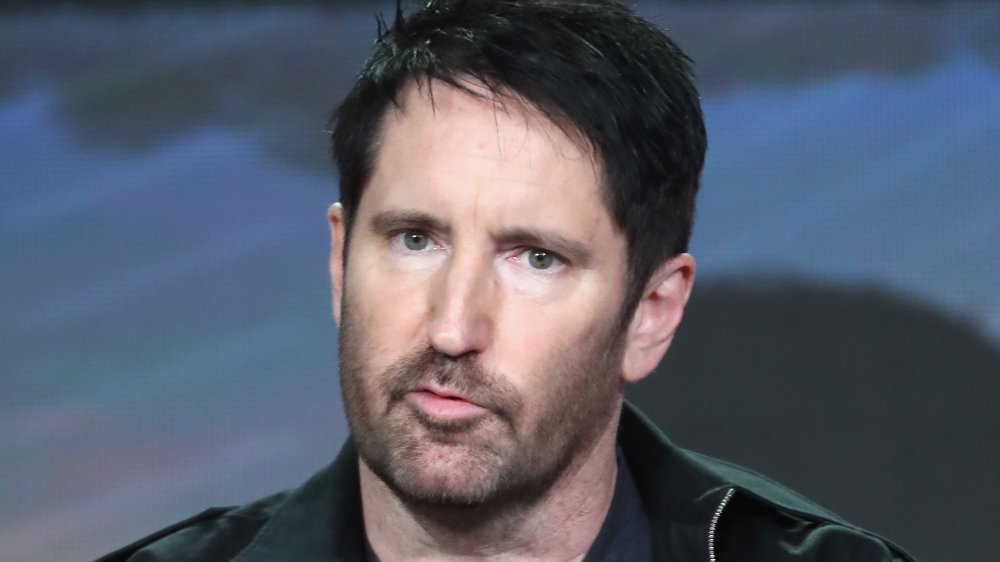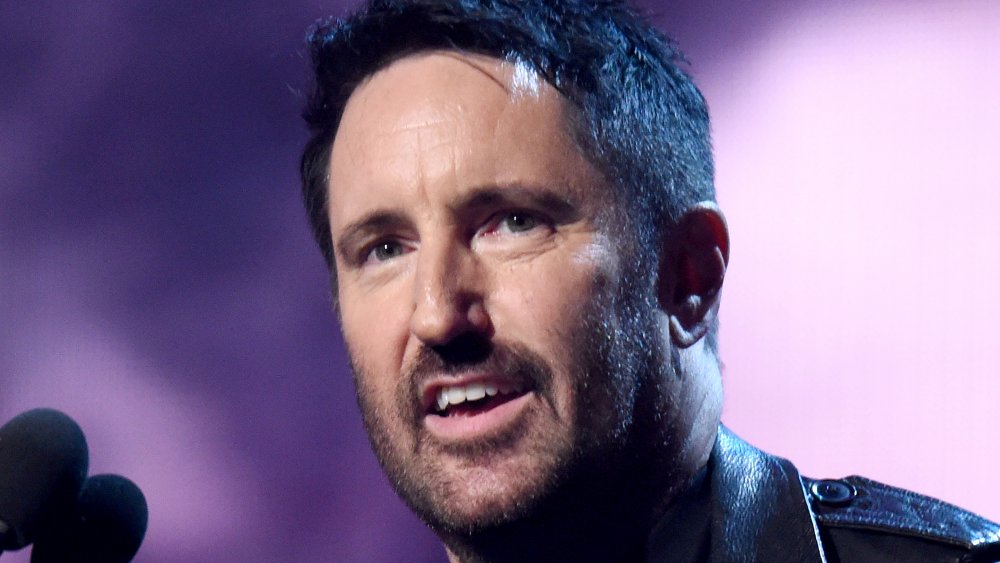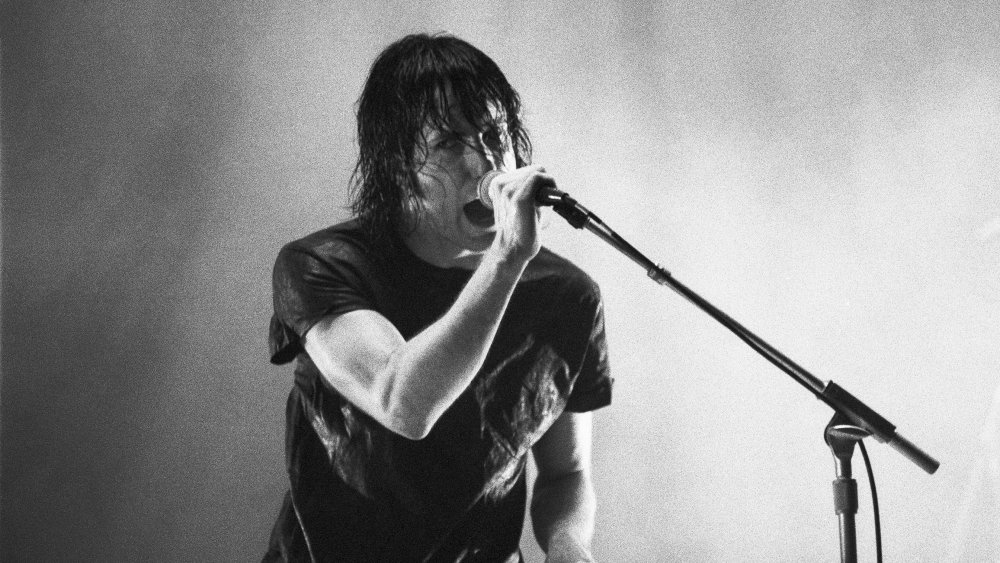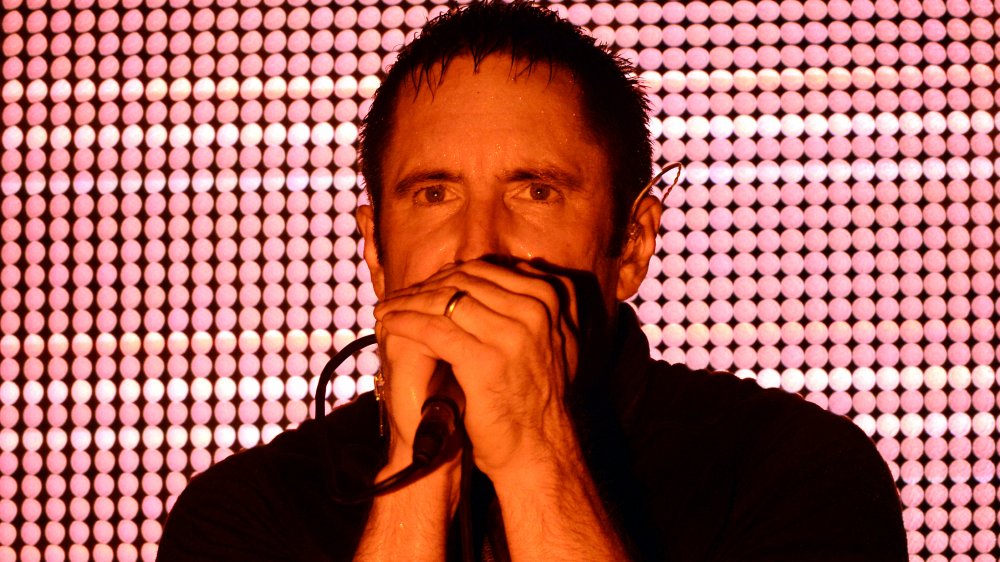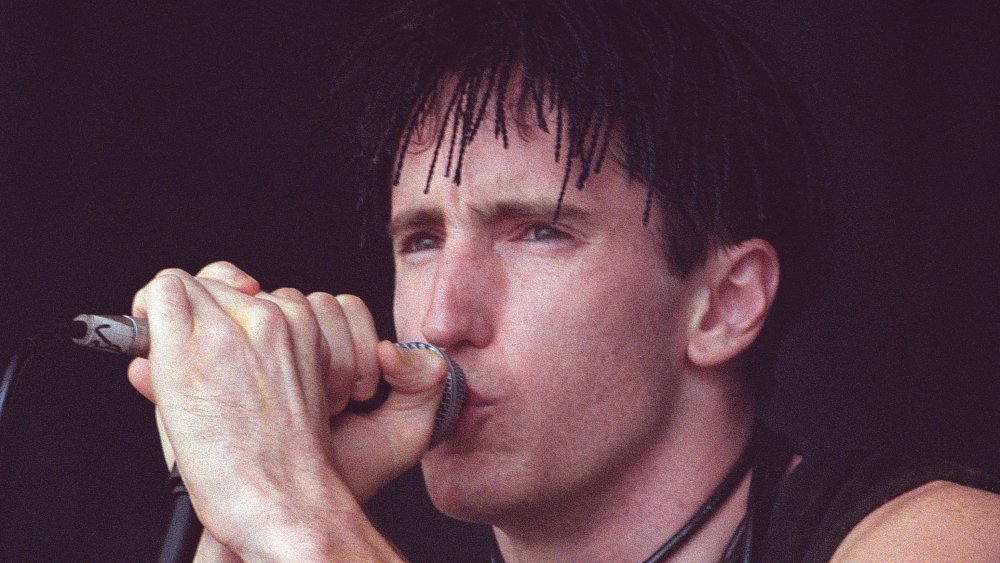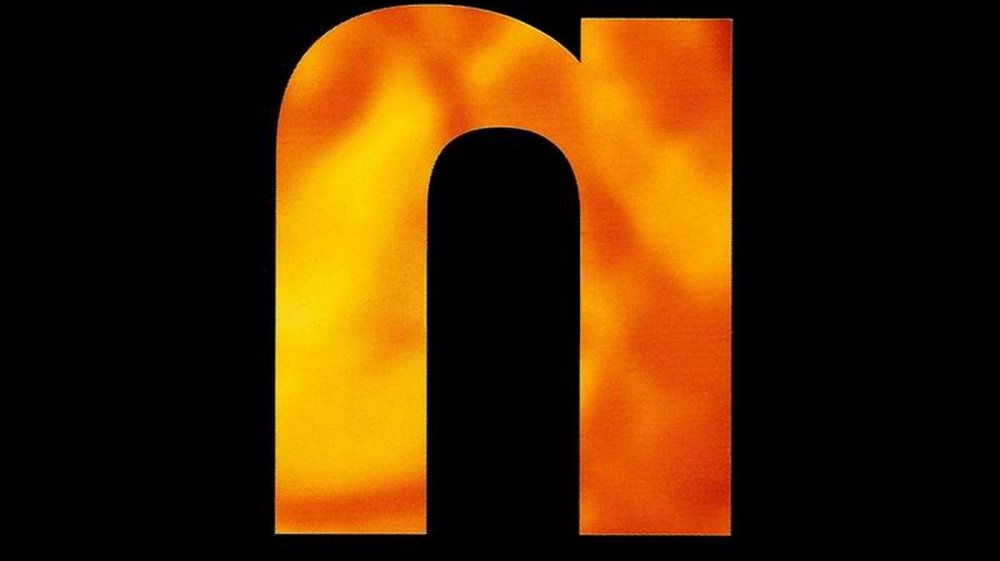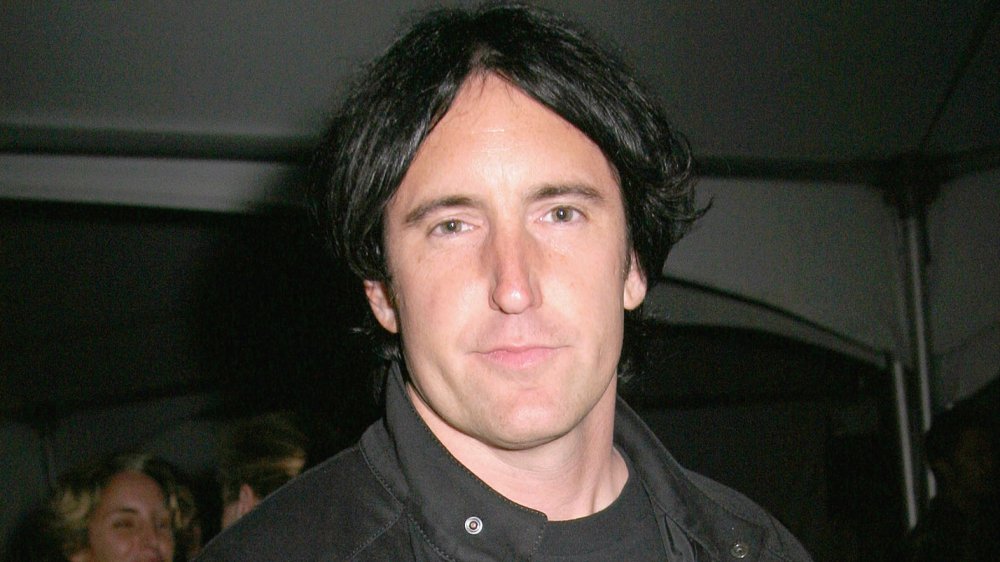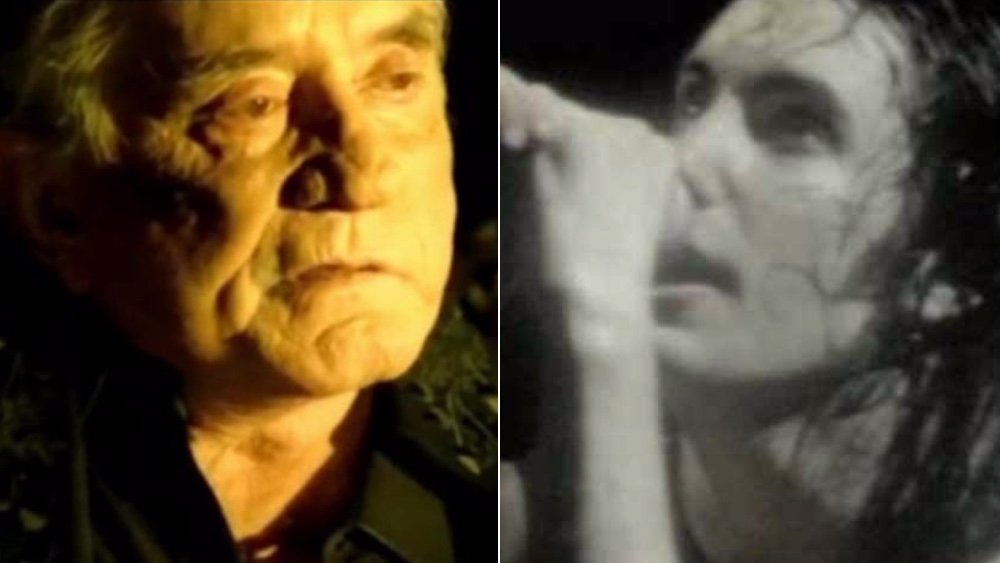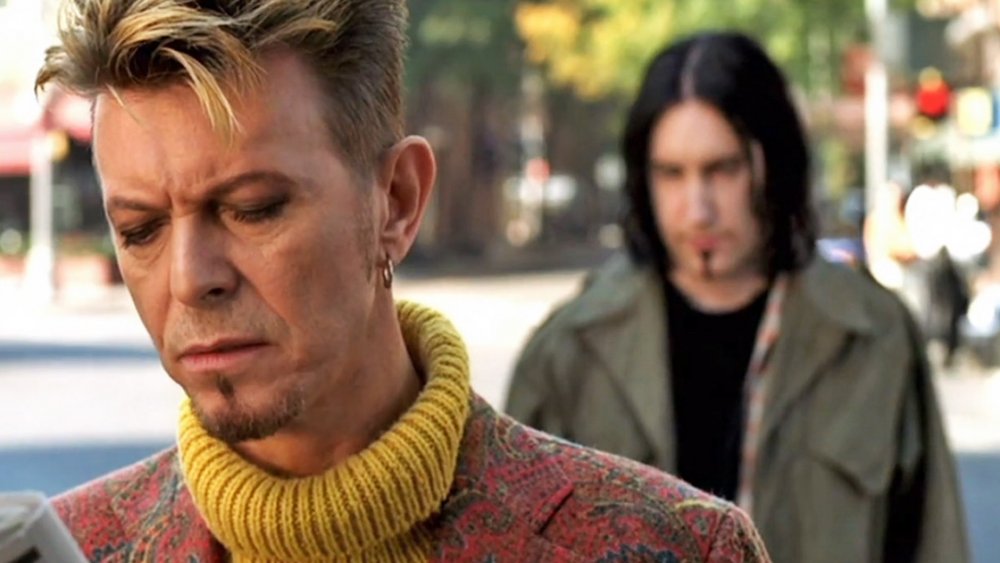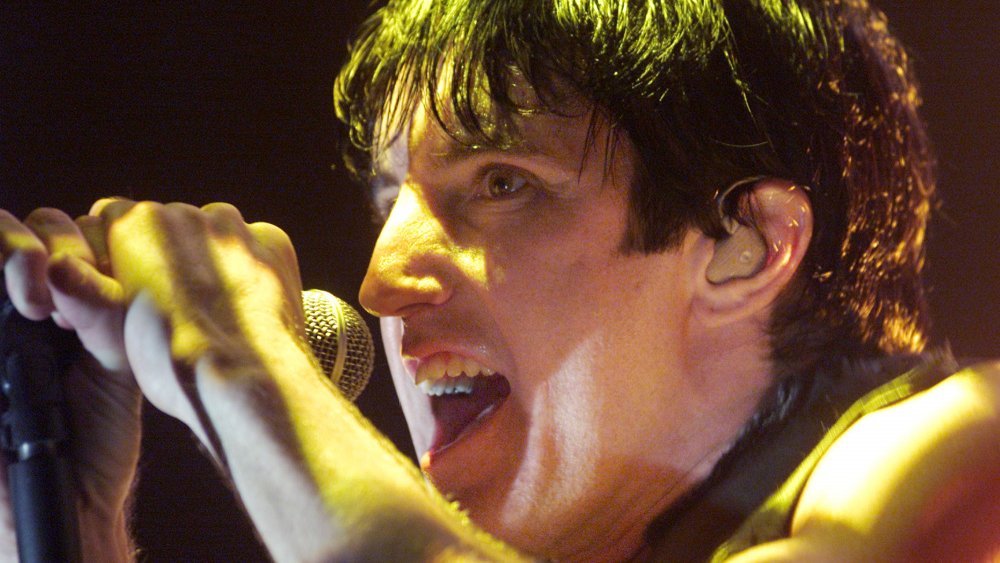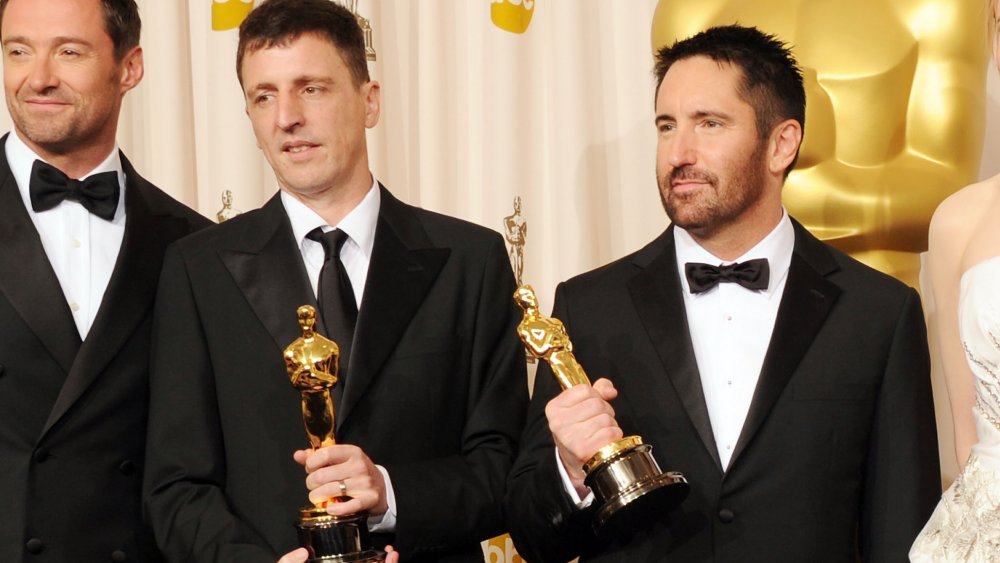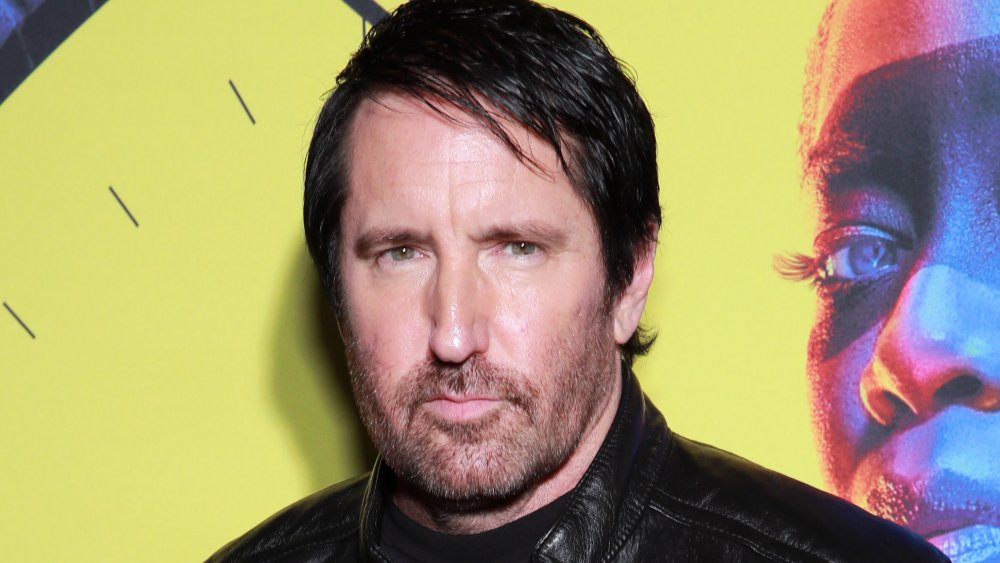What Fans Don't Know About Trent Reznor
Nine Inch Nails emerged in the late '80s and early '90s, offering something completely different from the slick and shiny radio pop of the day. Sure, the band's leader and only permanent member, Trent Reznor, made his chaotic noise with keyboards, guitars, and drum machines like everybody else, but his tunes came from a much darker and more tormented place. A singer, a multi-instrumentalist, and studio wizard of great renown, millions of Generation Xers and Millennials found a friendly voice and a kindred spirit in Reznor's emotionally intimate Nine Inch Nails songs, not to mention a taste of the little-explored-in-song areas of brutality and carnality.
Reznor provided rave and release alike with songs like "Down In It," "Head Like a Hole," "March of the Pigs," "Closer," "The Perfect Drug," and "The Hand That Feeds." He is a talented and devoted artist, the kind of guy who lets his music take care of his personal expression, so he remains something of a mystery. Here, then, are some little-known tales of the life and career of Trent Reznor.
Trent Reznor got his start in a marching band and school plays
As the chief creative mind and musician behind Nine Inch Nails, Trent Reznor rose to a position as one of the coolest, darkest, and edgiest musicians of the 1990s, an era positively lousy with cool, dark, and edgy rock guys. But everybody's got to start somewhere, and Reznor's first forays into music were decidedly not as unassailably hip — or as tortured — as stuff like "March of the Pigs" or "The Perfect Drug."
After his parents divorced when he was six, Reznor was raised by his maternal grandparents just outside of Pittsburgh. "He was always a good kid," grandfather Bill Clark told People in 1995, adding that Reznor had a calm childhood filled with fishing, skateboarding, Boy Scout events, model plane construction, and playing the piano. "Music was his life from the time he was a wee boy. He was so gifted," Clark added, while Reznor's childhood piano teacher likened his jaunty playing to that of Harry Connick Jr.
That musical foundation paid off in school — Reznor played tenor sax and keyboards for the jazz and marching band and was such a good musical theater performer that he was named "best in drama" by his classmates prior to his graduation in 1983. Reznor apparently thrilled and delighted audiences as Judas in Jesus Christ Superstar and Professor Harold Hill in The Music Man, according to a Fresh Air interview.
Young Trent Reznor jammed out with Joan Jett and Michael J. Fox
As a teenager, Trent Reznor had a gift and affinity for music, including an aptitude for the keyboard. Luckily for him, upon graduating from Mercer Senior High School in 1983, synth-driven New Wave was in full bloom, offering him the opportunity to really go places with his band, Option 30. Far from the dark, industrial sounds of Nine Inch Nails, Option 30 was primarily a bright and sunny pop group. Reznor played synths and occasionally sang with the band, as he did on a faithful cover of the Falco/After the Fire '80s classic "Der Kommissar."
Around the same time, Reznor played keyboard for a midwestern synth pop band called Exotic Birds, departing after recording just one EP. Later on in the '80s, Reznor jumped into a band with a higher profile, albeit a fictional one, landing a bit part as a bar musician in Light of Day, a 1987 drama starring Michael J. Fox and Joan Jett as bar musicians. Just two years after playing in a fake band, according to People, Reznor would release the first Nine Inch Nails album.
Trent Reznor traded labor for studio time
After studying computer engineering at Allegheny College for a year, Reznor moved to Cleveland and paid the bills with a job adjacent to the music industry: He worked as a handyman for Right Track, a Cleveland recording studio later renamed Midtown Recording. Reznor apparently brought the precision and attention to detail heard on so many Nine Inch Nails songs to his work, keeping the place in order. "When that guy waxed the floor, it looked great," studio owner Bart Koster told People. The future rock star was really there for a fringe benefit — Koster let him have free range of the studio during unbooked, off hours: "It wasn't costing me anything, just a little wear on my tape heads."
A lot of those sessions were spent just figuring out how to use all the production gear. "I'd spent time at night learning how to record and engineer things, and I tried to work out how my voice sounded," Reznor told Kerrang (via The NIN Hotline). "I was playing everything myself." It was during those studio downtimes that Reznor recorded Pretty Hate Machine, the first Nine Inch Nails album, which reached stores in 1989 and boasted the hit single "Head Like a Hole," a song that Reznor says took him just 15 minutes to write. "The fact that it produced this huge reaction really p*ssed me off because I hadn't agonized over it."
An early Nine Inch Nails video led to an FBI investigation
The first single off Pretty Hate Machine, Nine Inch Nails' first album, was "Down In It," and according to Mental Floss, Trent Reznor hired visual artists Benjamin Stokes and Eric Zimmerman to make a video for it. The concept: Reznor is pursued through Chicago, and he falls off a building and plays dead on the ground, splattered in blood. Lacking the money for a crane shot of a deceased Reznor, directors tied a camera to some weather balloons ... but then the wind carried the makeshift apparatus to parts unknown. The video was completed and released without that final shot.
Meanwhile, around the time of the shoot, a Super 8 camera attached to weather balloons landed on Robert Reed's farm outside Burr Oak, Michigan, more than 100 miles away from Chicago. He turned it over to authorities, who, to investigate further, developed the film inside the camera. They found grisly footage of what looked to be a murder victim. The FBI eventually took over from state police in Michigan and city police in Chicago — the lights of the city's distinctive elevated train could be seen in the film.
After about a year of investigating with little progress, the FBI sent out flyers to Chicago-area schools to solicit tips. Finally, an art student saw "Down In It" on MTV in 1991 and recognized the imagery from a flyer he'd seen at school. It wasn't long after that Reznor finally got to explain the whole situation to the authorities.
The lost, banned, and controversial Nine Inch Nails film
In 1992, Nine Inch Nails released Broken, an EP of brutal industrial metal. Trent Reznor commissioned a promotional mini-movie/music video compilation also called Broken. As detailed by Revolver, that film, uncut and in its entirety, has been seen by very few individuals. Reznor hired visual artist Peter Christopherson to make a horror movie that felt real — like found footage, or snuff films. Christopherson delivered, producing a 20-minute movie that includes a shot of a man preparing for his hanging, another man being kidnapped and held hostage in a basement, an individual being drowned, and the video for the single "Wish" (which ends with the band being attacked by a mob of angry fans). Topping it all: a clip set to "Happiness in Slavery," featuring self-harm-inflicting performance artist Bob Flanagan getting tortured by a machine and ground into meat.
Even Reznor found the whole project to be too extreme and over-the-top and didn't commercially release it. He did, however, make some VHS copies for a few friends, some of which were bootlegged and discreetly traded. "Happiness in Slavery" showed up on a 1997 Nine Inch Nails music video compilation, but Broken in full remained a mysterious artifact, although it showed up on illegal download sites in 2006, and on Nine Inch Nails' Tumblr page in 2013, hosted by Vimeo. The release was brief: After just a few hours, Vimeo banned it for violating its "excessive violence" guidelines.
Trent Reznor accidentally lived in one of the most notorious homes in the U.S.
Nine Inch Nails' second album The Downward Spiral isn't just a bunch of tracks but more of a concept album about one person's descent into oblivion, or "someone who sheds everything around them to a potential nothingness, but through career, religion, relationship, belief, and so on," as Trent Reznor told Select (via Loudwire) upon its release in 1994. Reznor's songs explore life's darkest moments and man's worst impulses, all of which are present in the DNA of the project.
According to Entertainment Weekly, Reznor decided to record The Downward Spiral in a nice home in the Benedict Canyon area of Los Angeles and found one on Cielo Drive that was large enough to accommodate an in-home music studio. "I looked at a lot of places, and this just happened to be the one I liked most," Reznor said. He was already in the process of moving in when a friend, who thought the home looked familiar, confirmed their hunch with a little research — Reznor was taking residence in the house where in August 1969, followers of Charles Manson murdered its resident, actress Sharon Tate, and four guests. The musician opted to move in anyway, but it wasn't easy. "Little sounds would make me jump at first," he said. "The house didn't feel terrifying so much as sad — peacefully sad."
Trent Reznor was initially hurt when Johnny Cash covered Hurt
The third single off of Nine Inch Nails' 1994 album The Downward Spiral was "Hurt," a slow, emotional ballad about inner pain which sounded little like predecessor singles "March of the Pigs," a raucous rave-up, and "Closer," a dark dance jam. Reznor's version has since been almost completely and instantly forgotten after the legendary Johnny Cash recorded a stark, stripped-down, and haunting cover of it in 2002, only a year before he died.
Producer Rick Rubin asked for Reznor's blessing in advance of Cash's take, but then the Nine Inch Nails leader received a demo. "I listened to it and it was very strange. It was this other person inhabiting my most personal song," Reznor told The Sun (via NME). "Hearing it was like someone kissing your girlfriend. It felt invasive." But he got over those feelings: "Having Johnny Cash, one of the greatest singer-songwriters of all time, want to cover your song, that's something that matters to me. It's not so much what other people think but the honor that this guy felt it was worthy of interpreting."
David Bowie saved Trent Reznor's life
In 1997, two of the 20th century's most prominent and experimental musicians — Trent Reznor of Nine Inch Nails and David Bowie — collaborated on a jerky, twisty electro-pop single called "I'm Afraid of Americans." That came after Reznor remixed "The Hearts Filthy Lesson," a recording Bowie released in 1995, the same year Nine Inch Nails opened for Bowie on his Outside tour.
It was also during that time that Reznor found himself uneasy with sudden, massive success. "My way of dealing with life was to numb myself with drugs and alcohol," Reznor wrote in Rolling Stone. He knew he was on a "reckless, self-destructive path" but compared himself to Bowie, who he knew had also been through the ups and downs of fame and emerged "at peace with himself." The older rocker imparted guidance and advice, "pieces of wisdom that stuck with me: 'You know, there is a better way here and it doesn't have to end in despair or in death, in the bottom."
Reznor says he "hit bottom" about a year later but then got sober, and some time after, he tried to thank Bowie for all he did. "I started to say, 'Hey listen, I've been clear for...' I don't even think I finished the sentence; I got a big hug. And he said, 'I knew. I knew you'd do that. I knew you'd come out of that.'"
Trent Reznor refused to play the MTV Movie Awards for political reasons
One of the biggest albums of 2005 was Nine Inch Nails' With Teeth. The group's fourth album — and first in six years – debuted at #1 on the Billboard album chart and ultimately spawned three #1 alternative rock radio hits: "The Hand That Feeds," "Only," and "Every Day is Exactly the Same." In short, Trent Reznor's band was massive in 2005, a status which easily won it an invite to perform at that year's MTV Movie Awards.
Nine Inch Nails accepted the offer but then withdrew in late May, about a week before the show. According to Rolling Stone, Reznor planned to perform the very political "The Hand That Feeds" (sample lyrics: "There's a price to be paid for the blood on which we dine / justified in the name of the holy and the divine") while the stage was flanked with a photo of President George W. Bush. "Apparently the image of our president is as offensive to MTV as it is to me," Reznor wrote on Nine Inch Nails' website at the time. As for MTV, a spokesperson for the network said that although the channel "respect[s] Nine Inch Nails' point of view, we were uncomfortable with their performance being built around a partisan political statement."
Trent Reznor has a complicated relationship with music industry awards
Neither Trent Reznor, nor Nine Inch Nails, has ever been a media-friendly pop act, what with the band's many brooding, loud, and angry songs about death, mental illness, and social decay, but the world has still embraced frontman and group alike. Nine Inch Nails has reached the top 10 of the Billboard album chart eight times, sold millions of records, and received some of the music industry's highest accolades. Some of that's cool to Reznor, and some of it isn't. "Why don't the Grammys matter? Because it feels rigged and cheap — like a popularity contest that the insiders club has decided," Reznor told The Hollywood Reporter of his two Grammy Awards in metal categories.
In 2011, he won an Academy Award (with creative partner Atticus Ross) for the unnerving original score he composed for The Social Network – and he appreciates the statuette. "The movie side is interesting, challenging, different and rewarding in ways that I hadn't experienced through my music career." Reznor was similarly pleased in 2020, when Nine Inch Nails earned induction into the Rock and Roll Hall of Fame, an organization that Cleveland made a play to host back when Reznor worked in a drum machine store. "It's crazy to think all these years later that, wow, against all odds, I wound up as a part of that," he told Rolling Stone.
Trent Reznor doesn't mind a little piracy
Shortly after the spring 2007 release of the Nine Inch Nails album Year Zero, Trent Reznor wrote a blog post (via NME) taking Universal Music Group (parent company of his label, Interscope Records) to task for what he called an "absurd" price for the album in Australia. "As the climate grows more and more desperate for record labels, their answer to their mostly self-inflicted wounds seems to be to screw the consumer over even more," Reznor wrote. While other major releases ran about $21.99 Australian (roughly $18 American), Year Zero cost $34.99 ($29.10 American) Down Under. "As a reward for being a 'true fan' you get ripped off."
At a concert in Australia a few months later, Reznor ranted against Universal a bit more before offering a unique solution to his overcharged fans. "My record label all around the world hates me, because I yelled at them, I called them out for being greedy f***ing a**holes," Reznor said onstage (via Blabbermouth). "Has anyone seen the price come down? Okay, well, you know what that means — steal it. Steal away. Steal and steal and steal some more and give it to all your friends and keep on stealing."
Reznor subsequently parted ways with Interscope and Universal, and in 2008, he self-released a set of instrumental albums, Ghosts I-IV, along with The Slip. Deluxe physical versions of both projects were available for a fee, but otherwise, fans could download them for free.
